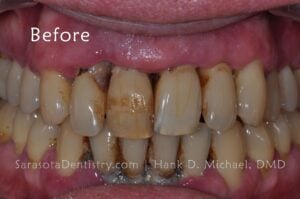It can be alarming to spot dark or black stains on your teeth. If you can rule out medication side effects or an underlying dental condition as causes, you can likely attribute the discoloration to black tartar.
Left untreated, black tartar on teeth can lead to unsightly staining, bad breath, cavities, and advanced gum disease. Understanding its causes and symptoms can make choosing the best treatment options easier.
What Is Black Tartar?
Eating anything starchy or sugary causes bacteria to accumulate on your teeth. Over time, these bacteria become plaque. When lack of brushing allows plaque to remain, it solidifies and forms tartar or calculus that gives your teeth a yellow appearance.
Black tartar is called subgingival tartar when it forms under the gum line. When tartar invades the blood vessels in your gums, it combines with the blood and proteins, causing a black appearance.
Causes of Black Tartar
Poor dental hygiene is the most common cause of black tartar on teeth. In addition to a lack of daily brushing and flossing, black tartar can build up due to staining beverages like coffee, soda, and wine, as well as sugary and starchy foods. Other culprits include bleeding gums, damage to the enamel, cigarette smoke, marijuana use, charcoal toothpaste, and some medications and food.
Symptoms of Black Tartar

- Foul breath
- Bleeding, sensitivity, or swelling in the gums
- Loose teeth
- Tooth discoloration
- Rough tooth surfaces
Gum disease can occur if black tartar on the gum line is left untreated. It can progress into periodontitis, an advanced form of gum disease usually resulting in tooth loss. If you notice one or more of the above symptoms, you should see your dentist as soon as possible.
In general, tartar is not something to take lightly. The longer it stays on your teeth, the more likely it will stain or turn black. Any black or dark coloring on your teeth needs attention.
Treatment Options
You cannot remove black with extra brushing or flossing; it needs professional cleaning at the dentist’s office. In addition, only your dentist will know how to remove black tartar from teeth. They typically use scrapers or scalers to get rid of the black tartar, depending on the level of buildup. They might also use an ultrasonic tool to loosen the hardened tartar.
Your dentist may also recommend scaling and root planing to remove black tartar from teeth and below the gum line. The procedure involves two steps. First, the hygienist uses a scaler, a hook-shaped stainless-steel instrument, to detach the tartar from the surface of the teeth and below the gums. In the second step, the hygienist uses that scaler to smooth out the roots and reattach the gums to the teeth.
Scaling and root planing typically involve administering a local anesthetic or topical Oraqix beforehand to prevent pain and discomfort. This two-part procedure might require more than one office visit, depending on how much tartar has accumulated.
Preventing Black Tartar
Good oral hygiene regularly is a simple but effective way to reduce tartar buildup. Regular dentist visits for professional cleanings and check-ups combined with twice-daily brushing with an electric toothbrush and regular flossing provide a well-rounded line of defense. Other prevention strategies include:
- Asking your dentist or dental hygienist for recommendations on a water flosser or specialized brush
- Checking regularly for any changes in your mouth, gums, and teeth
- Drinking lots of water
- Consuming green tea to reduce bacteria in the mouth
- Limiting consumption of starchy foods and sugary snacks and beverages
- Scheduling a professional dental cleaning every six months
- Stopping smoking and avoiding all tobacco products
- Using fluoride mouthwash every day
- Brushing with toothpaste with fluoride, baking soda, or any ingredient designed to prevent tartar
- Using hydrogen peroxide or anti-tartar whitening strips in moderation
After each professional cleaning, preventing black tartar and any extra buildup still requires daily oral hygiene on your part. Some people are more prone to excess plaque and tartar. If this applies to you, consider getting professional cleaning more often than twice a year.
A little extra vigilance can prevent black tartar or other problems from affecting your oral health. If you notice any symptoms or feel that something is not right with your teeth, you are better off checking with your dentist. Early intervention can help you avoid more severe issues later on.
- Dental Implant Pros and Cons - August 26, 2023
- Receding Gums Stages - August 12, 2023
- When Is It Too Late for Gum Grafting? - July 8, 2023


